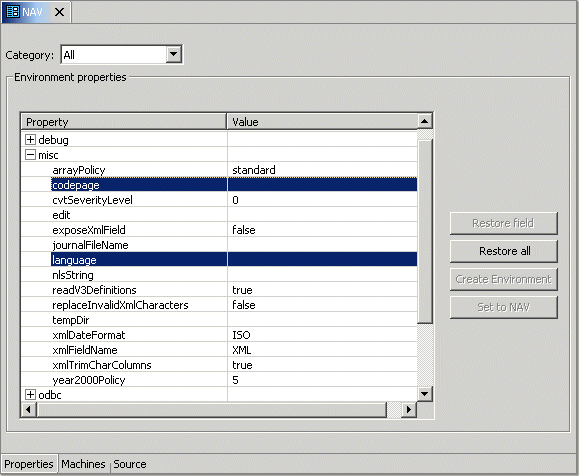| Oracle® Application Server Adapter for Tuxedo User's Guide 10g Release 2 (10.1.2) B15802-01 |
|
 Previous |
 Next |
| Oracle® Application Server Adapter for Tuxedo User's Guide 10g Release 2 (10.1.2) B15802-01 |
|
 Previous |
 Next |
OracleAS Adapter for Tuxedo provides the globalization support for the following languages:
Arabic.
English (the default).
Hebrew.
Japanese.
Korean.
Simple Chinese.
Spanish.
Traditional Chinese.
This appendix describes how to define the language support.
The language and codepage parameters are accessed from the computer where Oracle Studio is installed.
Perform the following steps to define the required language and codepage:
From the Start menu, select Programs, Oracle, and then select Studio.
Select the computer defined in "Configuring OracleAS Adapter for Tuxedo in Oracle Studio".
Right-click NAV and select Edit Binding.
In the Binding Properties tab, expand the misc node.
The NAV binding Properties tab is shown in the following figure:
Figure C-1 The NAV Binding Properties tab

Enter a valid value for the language. The following language codes are valid:
ARA: Arabic.
ENG: English.
HEB: Hebrew.
JPN: Japanese.
KOR: Korean.
SCHI: Simple Chinese.
SPA: Spanish.
TCHI: Traditional Chinese.
Optionally, in the codepage field, specify the codepage required.
You can skip this step, and specify a language (see the previous step). In this case, a default codepage is used. The following shows the default codepages:
ARA: AR8ISO8859P6
ENG: EBCDIC
HEB: IW8ISO8859P8
JPN: JA16SJIS on all platforms except for Solaris Operating System (SPARC), where the default is JA16EUC
KOR: KO16KSC5601
SCHI: ZHS16CGB231280
SPA: WE8EBCDICLATIN
TCHI: ZHT16BIG5